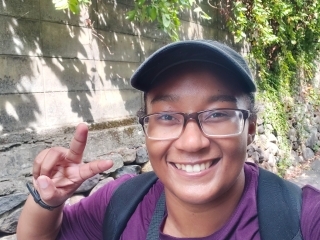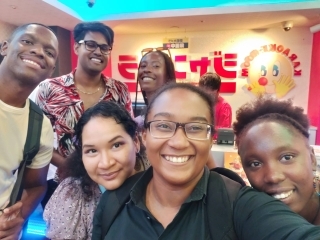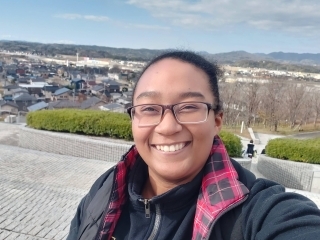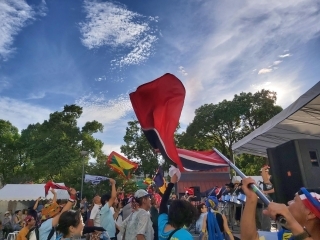Jet Programme Series: Nunc coepi (Now I begin) - Anisha Romany
2024/7/3



Jet Programme Series: Nunc coepi (Now I begin) - Anisha Romany

Hello there. Greetings from Central Ishikawa! It’s been almost five months since I moved to Japan and began my journey as an ALT. My time so far has been inundated with many emotions. Each new experience stirs something within me that cannot help but foster and propel growth. I’d like to share a bit about what it has been like.
The first month was almost surreal. The journey to Japan itself was far longer than I had ever travelled before. In spite of the severe jet lag, the whirlwind orientation saw us collaborate with others who were just as excited about this new chapter as we. I enjoyed bonding with my fellow Trinis and I was also happy to meet people from many different backgrounds and cultures. We were joyfully welcomed by a cohort of Trini expats and Japanese lovers of T&T who kindly offered their support as we began our new adventure. We even had an impromptu trip to Shibuya Crossing!
Our three day orientation complete, we were off to our separate placements in prefectures across Japan. The city in which I was to serve was Kahoku City, in Central Ishikawa. Ishikawa is a beautiful, homey prefecture. Its picturesque mountains and bountiful fields remind me of my home in Paramin. I have done some exploring of the prefecture, chiefly the areas surrounding Kahoku and the prefectural capital, Kanazawa. Walks through the samurai districts, visits to sites of historical and cultural significance like Kanazawa Castle and various shrines and temples have all helped me to develop a deeper understanding of and appreciation for Japan and its people. There is still much I have to explore, but I intend to make the most of my time here and continue learning about Japan’s heritage.
In September, I had the wonderful opportunity to visit a fellow Trini ALT, who was kind enough to host me for the weekend. We had planned to attend the Steelband Carnival in Kobe City, an annual event that brought together steelbands from all over Japan. The event itself was incredibly fun. It was so nice to hear the familiar sounds of the steelpan. There are few things that evoke a sense of pride and joy in me like the steelpan does. At this event, I met both Japanese and foreign nationals alike who all loved the steelpan. I listened to their stories, many of them who had travelled to Trinidad and Tobago just to play pan. One group, Sukiyaki, invited me to visit them. They are based in the neighbouring prefecture, Toyama. A few weeks later, I eventually made the trip over and enjoyed listening to and playing with them during their rehearsal. Arrangements of both soca/calypso and Japanese tunes were a delight to hear on some pleasantly tuned pans. Were it not for the distance, I may have accepted their offer and committed to weekly rehearsals. Nevertheless, I am grateful for their warm hospitality and their beautiful treatment of and respect for the steelpan.
The best part about visiting Kobe City, however, was the warm group of Trinis and friends I encountered there. It was a meeting of old and new friends alike. They really made a sincere effort to make me feel welcome, taking me to their favourite sites, restaurants, and even my first time at a karaoke bar! I am blessed to have had the opportunity to meet with them.
As it pertains to work, I absolutely love working at the three schools to which I have been assigned. The staff are friendly, professional and courteous. I am learning so much from them about being an educator, but more so what it means to be a part of a community. It is inspiring to see the way that they look out for one another and how they take on responsibility for the sake of the community. The English teachers are excellent models as I aspire towards a career in foreign language education. I have been taking copious amounts of physical and mental notes in the hope of emulating some of their best traits and practices upon returning to Trinidad to work as a teacher. I am especially humbled by the teachers who do not speak much English but who still try to communicate with me and who try to make me feel welcome.
This brings us to one of the biggest challenges I have faced to date; loneliness. I think it’s one thing to live in a different country by yourself, and another thing when that country’s primary language is not your own (or one in which you are even remotely competent). I had been studying Japanese on my own for about two years before I moved to Japan and let me tell you, it was not nearly enough. I still felt overwhelmed. I still struggled. Not being able to say what you want and or need is incredibly frustrating, which I suppose is why we need foreign language education in the first place. The good news is that it gets better. The not-so-fun news is that it will take time. I am almost five months in and I am just starting to feel like I am treading water. The online lessons provided by CLAIR as well as my own materials and the immersion provided by my schools and the community at large have propelled my Japanese language skills much further than I had anticipated. I am happy with how I am progressing and I have developed a deeper love and appreciation for the language and culture. Experiencing the language in a somewhat familiar environment helps. I go to a Japanese mass every weekend and I’ve even had to do confession in Japanese. It was overwhelming at first, but the structure of the Sacraments and the grace imparted through them no matter what language have kept me going. The little booklets for kids with the mass responses in furigana are also super helpful. I have also joined the Kahoku City Brass Band. I bought a trumpet since it's comparatively small and it is an instrument I had not trained in before. The sessions are exclusively in Japanese so it can be hard to follow sometimes, but the beautiful thing about music is that it's quite universal. Fortunately, I can read music and I have amassed enough vocabulary to follow the conductor when he speaks about cues and measure pickups. It’s not always easy, but I am grateful for the community I’ve found and I look forward to making more beautiful music together.
The best part about my experience so far has been connecting with the students. I work primarily at a junior high school and I visit two elementary schools biweekly. The kids are wonderful, full of life and have much to offer. Many of them are curious about English and cultures different from their own. Whether a simple hello in passing in the hallways or on the way to school, or a loud or quizzical, “Anisha-sensei” at the mall or grocery store, I always love hearing their little voices as they try to speak with me. I have been visiting some of their club activity practices and even attended some games and concerts. Even there, I engage with the students who try to communicate about their chosen sport/art in a callaloo of English and Japanese. It has been a great joy seeing their efforts. I have also had the opportunity to share some of Trinidad and Tobago’s culture, through English boards at school, lessons on food culture, making gulab jamoon for Divali, and singing and playing parang for staff and students. The cultural exchange is a highlight of this experience. I look forward to more wonderful exchanges in the near future.
JET Series: Nunc Coepi - Now I Begin (Japanese Embassy's Facebook)
JET Programme Series Archives
The first month was almost surreal. The journey to Japan itself was far longer than I had ever travelled before. In spite of the severe jet lag, the whirlwind orientation saw us collaborate with others who were just as excited about this new chapter as we. I enjoyed bonding with my fellow Trinis and I was also happy to meet people from many different backgrounds and cultures. We were joyfully welcomed by a cohort of Trini expats and Japanese lovers of T&T who kindly offered their support as we began our new adventure. We even had an impromptu trip to Shibuya Crossing!
Our three day orientation complete, we were off to our separate placements in prefectures across Japan. The city in which I was to serve was Kahoku City, in Central Ishikawa. Ishikawa is a beautiful, homey prefecture. Its picturesque mountains and bountiful fields remind me of my home in Paramin. I have done some exploring of the prefecture, chiefly the areas surrounding Kahoku and the prefectural capital, Kanazawa. Walks through the samurai districts, visits to sites of historical and cultural significance like Kanazawa Castle and various shrines and temples have all helped me to develop a deeper understanding of and appreciation for Japan and its people. There is still much I have to explore, but I intend to make the most of my time here and continue learning about Japan’s heritage.
In September, I had the wonderful opportunity to visit a fellow Trini ALT, who was kind enough to host me for the weekend. We had planned to attend the Steelband Carnival in Kobe City, an annual event that brought together steelbands from all over Japan. The event itself was incredibly fun. It was so nice to hear the familiar sounds of the steelpan. There are few things that evoke a sense of pride and joy in me like the steelpan does. At this event, I met both Japanese and foreign nationals alike who all loved the steelpan. I listened to their stories, many of them who had travelled to Trinidad and Tobago just to play pan. One group, Sukiyaki, invited me to visit them. They are based in the neighbouring prefecture, Toyama. A few weeks later, I eventually made the trip over and enjoyed listening to and playing with them during their rehearsal. Arrangements of both soca/calypso and Japanese tunes were a delight to hear on some pleasantly tuned pans. Were it not for the distance, I may have accepted their offer and committed to weekly rehearsals. Nevertheless, I am grateful for their warm hospitality and their beautiful treatment of and respect for the steelpan.
The best part about visiting Kobe City, however, was the warm group of Trinis and friends I encountered there. It was a meeting of old and new friends alike. They really made a sincere effort to make me feel welcome, taking me to their favourite sites, restaurants, and even my first time at a karaoke bar! I am blessed to have had the opportunity to meet with them.
As it pertains to work, I absolutely love working at the three schools to which I have been assigned. The staff are friendly, professional and courteous. I am learning so much from them about being an educator, but more so what it means to be a part of a community. It is inspiring to see the way that they look out for one another and how they take on responsibility for the sake of the community. The English teachers are excellent models as I aspire towards a career in foreign language education. I have been taking copious amounts of physical and mental notes in the hope of emulating some of their best traits and practices upon returning to Trinidad to work as a teacher. I am especially humbled by the teachers who do not speak much English but who still try to communicate with me and who try to make me feel welcome.
This brings us to one of the biggest challenges I have faced to date; loneliness. I think it’s one thing to live in a different country by yourself, and another thing when that country’s primary language is not your own (or one in which you are even remotely competent). I had been studying Japanese on my own for about two years before I moved to Japan and let me tell you, it was not nearly enough. I still felt overwhelmed. I still struggled. Not being able to say what you want and or need is incredibly frustrating, which I suppose is why we need foreign language education in the first place. The good news is that it gets better. The not-so-fun news is that it will take time. I am almost five months in and I am just starting to feel like I am treading water. The online lessons provided by CLAIR as well as my own materials and the immersion provided by my schools and the community at large have propelled my Japanese language skills much further than I had anticipated. I am happy with how I am progressing and I have developed a deeper love and appreciation for the language and culture. Experiencing the language in a somewhat familiar environment helps. I go to a Japanese mass every weekend and I’ve even had to do confession in Japanese. It was overwhelming at first, but the structure of the Sacraments and the grace imparted through them no matter what language have kept me going. The little booklets for kids with the mass responses in furigana are also super helpful. I have also joined the Kahoku City Brass Band. I bought a trumpet since it's comparatively small and it is an instrument I had not trained in before. The sessions are exclusively in Japanese so it can be hard to follow sometimes, but the beautiful thing about music is that it's quite universal. Fortunately, I can read music and I have amassed enough vocabulary to follow the conductor when he speaks about cues and measure pickups. It’s not always easy, but I am grateful for the community I’ve found and I look forward to making more beautiful music together.
The best part about my experience so far has been connecting with the students. I work primarily at a junior high school and I visit two elementary schools biweekly. The kids are wonderful, full of life and have much to offer. Many of them are curious about English and cultures different from their own. Whether a simple hello in passing in the hallways or on the way to school, or a loud or quizzical, “Anisha-sensei” at the mall or grocery store, I always love hearing their little voices as they try to speak with me. I have been visiting some of their club activity practices and even attended some games and concerts. Even there, I engage with the students who try to communicate about their chosen sport/art in a callaloo of English and Japanese. It has been a great joy seeing their efforts. I have also had the opportunity to share some of Trinidad and Tobago’s culture, through English boards at school, lessons on food culture, making gulab jamoon for Divali, and singing and playing parang for staff and students. The cultural exchange is a highlight of this experience. I look forward to more wonderful exchanges in the near future.
JET Series: Nunc Coepi - Now I Begin (Japanese Embassy's Facebook)
JET Programme Series Archives
